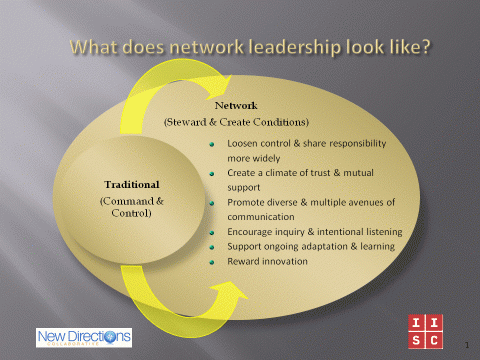Tag Archive: trust
September 25, 2012

I’m a process junky. I believe that good process makes it possible to do things that would be impossible otherwise. Any effort ambitious enough to try and shift a system from competition to common intention is an effort that must rely on good process. Good process provides and often temporary social architecture that is designed and facilitated to maximize generative collaboration.
Read More
September 21, 2012

The following is a letter by Akaya Windwood, President of the Rockwood Leadership Institute and member of the IISC Board of Directors.
About a week ago I was in my car on my way home, and traveling toward me on the busy sidewalk was a young man (20-ish) on a skateboard. It took a moment for me to register that he had a toddler-aged girl on his shoulders. Neither of them had helmets or shin pads or any protection whatsoever.
My first thought was “Stop! Get that child off his shoulders — they could both be killed if he hits a rock! This is child endangerment!!!” All my alarms started clanging, and I was on HIGH alert.
Read More
September 7, 2012

If you’ve been reading Curtis’ blog posts this week, you might be considering what it means to be an evolutionary. If you live in or near Boston, you should join us as we deepen this conversation.
Our friends at EnlightenNext Boston are hosting a dialogue between Amy Edelstein, senior teacher of Evolutionary Enlightenment and myself this Friday, September 21, 7:15pm – 9:30pm at Samadhi Integral in Newton Centre.
Read More
July 31, 2012

If you are a frequent reader of our blog you know that I am privileged to be one of the facilitators of the Barr Fellows Network, one of the best network building efforts that I know of. The following is a blog post from the Social Capital Blog, it is written by Pat Brandes, President of the Barr Foundation and the one who conceived the idea.
Read More
July 30, 2012

We have had the privilege of working with Year Up since 2008, when they launched a diversity and inclusion process. That learning journey has built a broad-based understanding and commitment to diversity, equity and inclusion as central to achieving Year Up’s mission of bridging and closing the “opportunity divide” that prevents so many urban young people from connecting to educational and economic opportunities.
Read More
July 11, 2012

It often emerges as a core tension in our complex multi-stakeholder change work. It’s embodied in comments such as, “Let’s stop all this talking and start doing something!” Or, “I’m not a big process person, I just want to get to action.”
In the New England Regional Food Summit two weeks ago, speaker Rich Pirog raised the importance of trying to find, in an ongoing fashion, a balance between process and action. This he has learned from doing many years of building regional food networks in the Midwest. It is certainly the case that we can over-talk, over-think and over-process together, driving one another crazy and/or from the room. And we can also jump blindly, prematurely, and harmfully to action.
So how do we strike an artful balance and keep differently oriented people in the game? A few thoughts:
Read More
July 9, 2012

We spend a lot of time at IISC thinking about how to talk about and practice love as a force for social change. Mike Edwards claimed in 2003 that “that the future of our world depends on how successful we are in developing and applying a new social science of love… applied in and through the systems that are essential to the functioning of all successful societies…[This kind of love is best illuminated by Rev. Dr.] Martin Luther King’s philosophy of the “love that does justice”, signifying the deliberate cultivation of mutually-reinforcing cycles of personal and systemic change…
Read More
June 12, 2012

I’m a big fan of “Open Space,” I like trusting people who have passion. I believe in the power of connection through self-organization. It is too often that the most interesting conversations at the conference actually happen at the break or at the bar or at the after-party. Let’s move what matters to the center! Here is a helpful reflection by my friend Chad Jones.
Open space is a way to break up the mundane, old ways of conferences. Just as we are realizing that rote memorization does not work in the classroom, and education needs to be shaken up. Our meetings and multi-day conferences need strong winds of new ideas and currents of new ways.
Read More
May 21, 2012

I just read a helpful Upmarket blog post on the distinction between strategy and tactic. It was almost a relief to know that the business sector also struggles with the distinction. Confusing these two terms has led to a lot of trouble in our work for social change.
Read More
May 21, 2012

You’ve heard that “it takes a village to raise a child.” It also takes a village to make an IISC engagement happen. I want to raise up a shout out and express my grateful for the excellence with which our colleagues do the detailed behind-the-scenes work that makes IISC’s practice possible.
Read More
May 15, 2012

I’m just coming out of a mind bending, heart expanding retreat with Orland Bishop, Rachel Bagby and the Barr Fellows Network. It was one of those experiences that is hard to put into words. For lack of a better word, and I hope Orland doesn’t mind this, it was more like being with a shaman than with a facilitator.
Orland led us in an exploration of intention and attention as he invited us to question how we relate to reality itself. He led with the idea that our relationships – and therefore our human experience – can be radically redefined if we make it our purpose to truly understand the other; and to do it with radical acceptance.
Read More
May 9, 2012

As I prepare to do a couple of trainings for leadership in multi-stakeholder networks in the New England region (focus being on the skills of facilitation, process design, and managing decision-making), I intend to frame our conversations with some exploration of the differences between traditional organizational leadership and what is required to steward networks towards positive impact. I begin with the presumption that network form and function are chosen strategically for the ability to accomplish something that could not be done at all or as well through other approaches. Whether trying to develop a food system to eliminate food insecurity or change an educational system to yield more equitable opportunities and outcomes, the attraction to a network approach is likely due to a desire for some combination of the following: Read More











